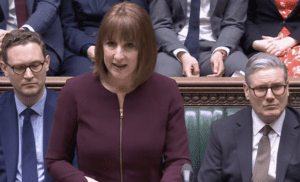Chancellor Rachel Reeves has told MPs that Bank of England governor Andrew Bailey has confirmed that financial markets are “functioning effectively” and that the UK’s banking system remains resilient, despite the escalating global uncertainty caused by President Trump’s new tariffs.
Speaking in the House of Commons, Reeves took the unusual step of opening Treasury questions with a short statement addressing the global reaction to the US’s decision to impose sweeping tariffs on foreign imports. Her comments echoed Labour leader Keir Starmer’s speech earlier this week, calling for a measured, pragmatic response that keeps the UK’s national interest at its core.
Reeves emphasised that the government was “keeping nothing off the table” in terms of potential retaliatory measures, while underlining the importance of calm diplomacy.
“The United States’ decision to impose tariffs has had and will continue to have huge implications for the world economy,” Reeves said. “These implications have been reflected in the reaction that we’ve seen in global markets in recent days, which the financial authorities have of course been monitoring closely.”
She confirmed she had spoken directly to Bank of England governor Andrew Bailey on Tuesday morning. “He has confirmed that markets are functioning effectively and that our banking system is resilient,” she told the Commons.
Her reassurances come as global financial markets continue to experience turbulence in response to President Trump’s protectionist measures, which have already prompted retaliation from key US trading partners. The UK government, alongside EU leaders, is considering its next steps amid mounting pressure from business groups worried about supply chains, export viability, and increased costs.
The Chancellor’s statement will be seen as an attempt to instil market confidence and reinforce the UK’s position as a stable and reliable economy amid wider geopolitical uncertainty.
Read more:
Rachel Reeves tells MPs Bank chief says ‘markets functioning effectively’ despite tariffs crisis

